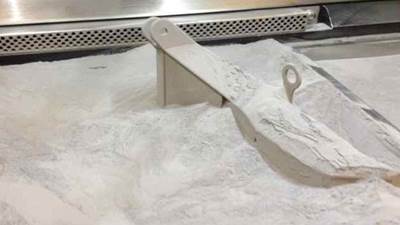Stratasys, Eckhart Agreement to Advance AM for Factory Tools
The collaboration will support 3D printing for industrial tooling in North America.
Stratasys and Eckhart Inc. have announced an exclusive three-year collaboration agreement to advance the adoption of 3D printing for factory tooling in North America.
For over 60 years Eckhart has been building tools that manufacturers use to make their production lines safe and efficient. The company’s advanced manufacturing solutions are used to assist and automate the assembly process for industries such as automotive, aerospace, heavy construction, medical and others. For example, Eckhart’s ergonomic lift-assist and torque-mitigating tools allow a technician to perform tasks like lifting and positioning a car engine while it is bolted to the chassis.
Eckhart believes that the tooling industry is ripe for change with the introduction of additive manufacturing technology to help redesign factory tools.
“At Eckhart, we believe that with additive manufacturing, there is a real opportunity to reinvent how industrial tools are designed, manufactured, and ultimately used by customers,” says Andy Storm, Eckhart president and CEO.
There are three ways Eckhart anticipates using additive processes to help the tooling industry:
- Lightweighting and ergonomics. The lighter and more organically shaped a tool is, the easier it is to operate and move around the assembly environment, Eckhart says. AM offers the ability to produce organically shaped parts that are lighter than conventional designs produced in metal, while still being strong. Stratasys’ carbon-fiber-reinforced nylon (FDM Nylon 12CF) has a strength-to-weight ratio that enables it to replace metal in many applications.
- Line-of-sight improvement. Additive manufacturing can be used to design voids in a tool. Traditionally made tools often have extra material that isn’t providing a value. By reducing the unneeded material, line-of-sight is improved. Cutting material out enables users to see more of the assembly operation.
- Simplified build structure and simplified bill of materials. Additive manufacturing can be used to significantly reduce the part count of an assembly. By redesigning an assembly of numerous parts into a single part and 3D printing it, designers can reduce the part count and thereby simplify both the build structure and the bill of materials for manufacture.
“Our intent is to completely replace existing metal tools with 3D-printed equivalents,” says Storm. “The potential for innovation in weight-savings, simplified bills-of-material, and enhanced operator visibility that additive manufacturing affords is unprecedented.”
“We’re looking forward to working closely with Eckhart to help redesign a new generation of factory tools,” says Stratasys Senior Vice President of Sales, North America, Patrick Carey. “Both companies not only have a great deal to offer one another, but a lot to learn from each other as well. Like Eckhart, Stratasys believes this three-year exclusive agreement has the potential to bring disruptive innovation to the industrial tooling market in North America.”
Eckhart’s 3D printing laboratory is located in its recently opened Advanced Technology Center in Warren, Mich. As part of the partnership with Stratasys, the lab includes printers using Stratasys’ fused deposition modeling (FDM) 3D printing process. The laboratory has Stratasys’ Fortus 450mc, F370 and Fortus 250mc 3D printers designed to produce on-demand parts, leveraging production-grade thermoplastics, as well as advanced manufacturing tools. Eckhart also uses a range of Stratasys materials, including the carbon-fiber-reinforced (FDM Nylon 12 CF).
In addition to accelerating the adoption of 3D printing, the partnership is aimed to leverage both companies’ expertise in adjacent markets to promote the adoption of Industry 4.0 and the use of micro sensors in 3D printed tools to begin integrating advanced diagnostics that will enable the smart factories of the future.
Read Next
Crushable Lattices: The Lightweight Structures That Will Protect an Interplanetary Payload
NASA uses laser powder bed fusion plus chemical etching to create the lattice forms engineered to keep Mars rocks safe during a crash landing on Earth.
Read MorePostprocessing Steps and Costs for Metal 3D Printing
When your metal part is done 3D printing, you just pull it out of the machine and start using it, right? Not exactly.
Read MoreProfilometry-Based Indentation Plastometry (PIP) as an Alternative to Standard Tensile Testing
UK-based Plastometrex offers a benchtop testing device utilizing PIP to quickly and easily analyze the yield strength, tensile strength and uniform elongation of samples and even printed parts. The solution is particularly useful for additive manufacturing.
Read More















